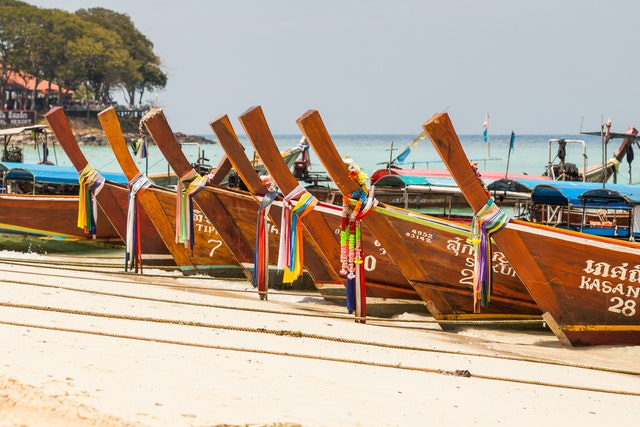The post-COVID tourism recovery in Thailand is expected to be propelled by two major forces. The first is the Baht’s low value, which is expected to help offset the current high prices of oil. The second is the recent legalization of cannabis in the country. In particular, cannabis is expected to play a big role in boosting health and wellness-related tourism owing to cannabis’s many benefits.
Tourism Recovery in Thailand to Be Supported by Cannabis Legalization


A weaker baht and the recent legalization of cannabis in Thailand could help lead the tourism recovery for the southeastern nation, which will end most pandemic restrictions on July 1.
Tourism Recovery to Be Aided by Low Cost of Living
The prediction comes from Thailand’s Tourism and Sports Minister, Phiphat Ratchakitprakarn. In a statement made last Thursday (June 23), he also noted Thailand’s low cost of living will help in the tourism recovery by offsetting high oil prices.
“A spike in oil prices is making travel costs higher everywhere, but the weak Thai baht and not-so-high cost of living will set us apart from other countries. When you come to Thailand, you spend less than pre-Covid-19, as the Thai baht has weakened by almost 20% during the pandemic.”
Phiphat Ratchakitprakarn, Tourism and Sports Minister, Thailand
Relaxed COVID Restrictions
Southeast Asia’s second-largest economy has scrapped its mask requirement, and pubs and bars can open as usual.
The country will also end mandatory pre-travel Thailand Pass registration from July to help boost the tourism recovery, which previously generated around 12% of gross domestic product and employed 20% of the total workforce.
Vaccinated travelers will have to show proof of vaccination, and for non-vaccinated, a Covid-19 test from less than 72 hours before departure.
Cautious Tourism Recovery Predictions
The country has set a “cautious” forecast to attract 7.5 million foreign arrivals this year, assuming Chinese tourists will remain absent due to the country’s Zero Covid policy and taking into account the war in Ukraine, it said. Phiphat said.
From July, estimates predict that foreign tourists will increase by 750,000 to 900,000 arrivals per month.
May arrivals rose 78% from the previous month to 521,410.
“Tourist arrivals this year could reach 10 million if Chinese travelers return to Thailand for their long vacation in October or if the war ends earlier than expected,” Phiphat said.
There are “positive signs” from China, with students and business people already allowed to travel between the two nations.
“It will be difficult to return to the peak of 40 million tourists in 2019 as traveler behaviors have changed due to the outbreak,” Phiphat added.
“So we set the target on tourism revenue instead.
Cannabis Will Boost Health and Wellness Tourism Recovery
In the Post-COVID tourism recovery, travelers will be more mindful and spend more on health and wellness.”
The medical and wellness tourism recovery in particular is expected to benefit from the recent legalization of cannabis and hemp, with many travelers seeking cannabis-infused foods and medicinal cannabis treatments.
The country will eventually consider whether it is permissible to use cannabis for recreational purposes, Phiphat said.
The Ministry of Tourism expects foreign tourist arrivals to reach 20 million next year and as many as 30 million in 2024.
Tourism Recovery to Reach 80% of Pre-Pandemic Levels by 2023
Tourism receipts, which also include domestic travel, are expected to reach 2.4 trillion baht (63.9 billion euros), or 80% of pre-pandemic levels, in 2023 and return to 2019 levels, to 3 trillion baht, in 2024.
Philpat added, “The government is in talks with airlines to add flights and increase the number of seats to 27 million by the end of the year, up from 17 million currently.”
The government could consider other incentives to help the tourism recovery, including a waiver of visa fees if tourism figures are not strong enough after July.
Long-term resident visas, which target wealthy individuals, retirees, and those wishing to work from Thailand, could be rolled out as early as next month.
Domestic flight prices are expected to remain low this year as the government extends the reduction in excise duty on kerosene.
—
(Featured image by Miro Alt via Pexels)
DISCLAIMER: This article was written by a third-party contributor and does not reflect the opinion of Hemp.im, its management, staff, or its associates. Please review our disclaimer for more information.
This article may include forward-looking statements. These forward-looking statements generally are identified by the words “believe,” “project,” “estimate,” “become,” “plan,” “will,” and similar expressions. These forward-looking statements involve known and unknown risks as well as uncertainties, including those discussed in the following cautionary statements and elsewhere in this article and on this site. Although the Company may believe that its expectations are based on reasonable assumptions, the actual results that the Company may achieve may differ materially from any forward-looking statements, which reflect the opinions of the management of the Company only as of the date hereof. Additionally, please make sure to read these important disclosures.
First published by Toute la Thailande, a third-party contributor translated and adapted the article from the original. In case of discrepancy, the original will prevail.
Although we made reasonable efforts to provide accurate translations, some parts may be incorrect. Hemp.im assumes no responsibility for errors, omissions, or ambiguities in the translations provided on this website. Any person or entity relying on translated content does so at their own risk. Hemp.im is not responsible for losses caused by such reliance on the accuracy or reliability of translated information. If you wish to report an error or inaccuracy in the translation, we encourage you to contact us.



Comments are closed for this post.